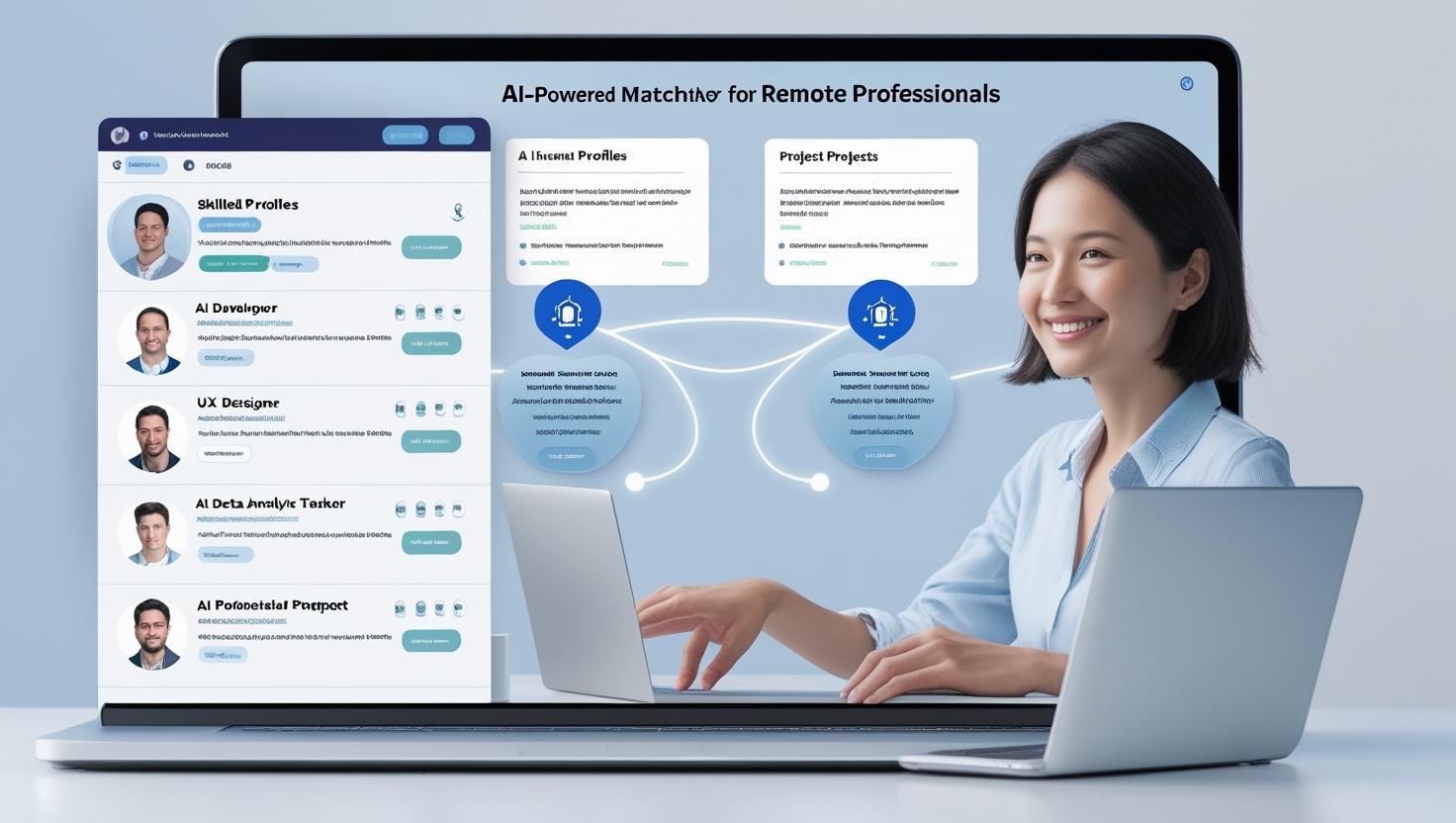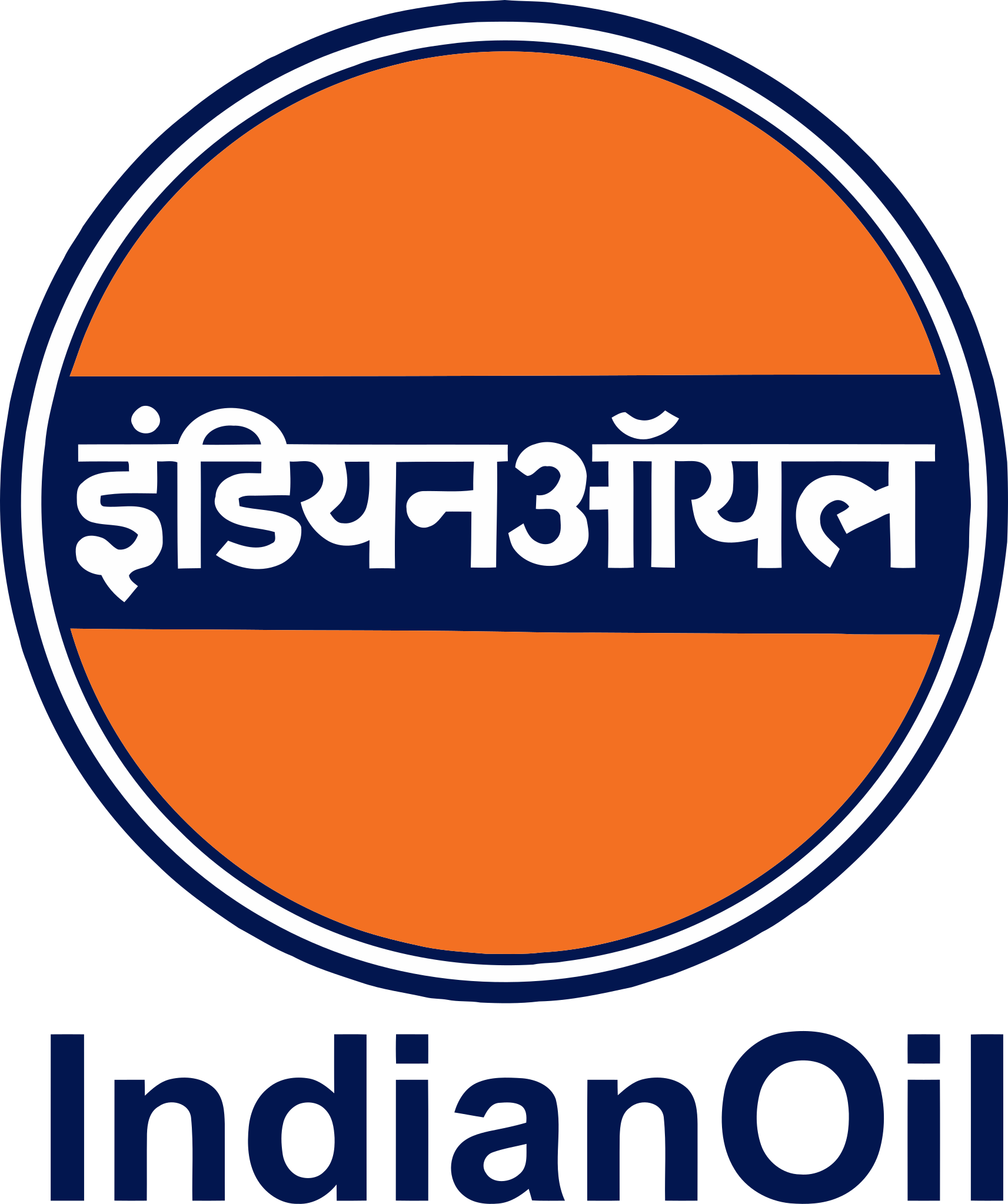AI Matchmaking MVP for Remote Jobs and Projects

Introduction
The way businesses hire and work has undergone a major transformation with the rise of remote jobs, freelance marketplaces, and contract-based project models. Traditional recruitment methods often fail to keep up with this fast-paced environment, especially when it comes to hiring remote professionals for short-term tasks or niche skill sets. Companies today are not just looking for resumes; they want the right skills, immediate availability, and proven reliability without spending weeks on interviews or job postings.
At the same time, millions of remote professionals struggle with low project visibility, delayed payments, and poor-fit roles on generic platforms. Job boards are cluttered with outdated listings, and freelance sites often lack quality control and match precision. This mismatch results in wasted time, lost productivity, and high project failure rates.
An AI matchmaking MVP for remote jobs and projects is designed to solve this disconnect. It uses artificial intelligence to create smarter, faster, and more relevant matches between clients and remote workers based on actual skills, live availability, and historical performance. With built-in features like real-time bidding and async communication, this MVP helps employers find the right talent quickly while giving freelancers better access to high-quality remote opportunities. It is a timely and scalable solution for the new era of global, distributed workforces.
What It Is
The AI matchmaking MVP is a digital hiring platform that uses artificial intelligence to match professionals with freelance or remote jobs based on their skills, availability, experience, and project needs. It automates the candidate shortlisting process, supports real-time project bidding, and allows async communication between clients and remote workers. It is designed for startups, agencies, and global teams looking to hire quickly without traditional recruitment delays.
How It Works
The MVP collects and analyzes data from user profiles, resumes, project descriptions, and client requirements. It uses AI algorithms to generate accurate talent-project matches based on skills, experience, and ratings. Real-time bidding allows freelancers to apply instantly with suggested rates and availability. Clients receive ranked suggestions and can initiate asynchronous interviews or task trials through integrated tools. The platform continuously learns from past matches to improve future results.
Challenges
- Overcrowded platforms with low-quality matches
Many remote job platforms are saturated with freelancers, making it hard for employers to find the right fit. Automated keyword filters often lead to irrelevant or unqualified matches, forcing recruiters to sift through dozens of mismatched applications. - Limited skill validation beyond resumes
Most systems rely on static resumes or self-reported profiles, which do not provide a full picture of a freelancer’s ability. There is no real-time verification of skills, recent project success, or compatibility with a specific work culture or toolset. - Inefficient manual screening process
Recruiters and clients spend hours manually reviewing profiles, conducting interviews, and scheduling tests. This slows down hiring and causes delays in project kickoffs, especially for urgent or short-term assignments. - Lack of real-time freelancer availability
Freelancer availability is often not updated or visible to clients. This leads to situations where companies contact professionals who are already booked, causing further delays and frustration in the hiring cycle. - Poor fit for async and remote collaboration needs
Traditional platforms are not optimized for asynchronous work. They lack built-in tools for time-shifted communication, task sharing, or performance tracking, which are essential for remote-first operations. - Difficulty in matching niche or hybrid roles
Projects that require a combination of technical and soft skills, or cross-functional experience, often go unfilled. Generic filters fail to capture this complexity, leading to lower match precision for high-value roles. - Lack of trust and transparency
New freelancers struggle to prove their credibility, while clients are unsure of the quality they will receive. There is often no reliable way to evaluate past collaboration style, deadline consistency, or client satisfaction beyond basic star ratings. - Time zone conflicts and scheduling gaps
Global hiring introduces scheduling challenges, especially when platforms do not offer filters or suggestions based on overlapping working hours. Misalignment in time zones can affect meetings, reviews, and overall project delivery speed. - Inconsistent pricing and bidding inefficiency
Without intelligent pricing suggestions, freelancers may underbid or overbid, and clients may receive a wide range of quotes for similar jobs. This inconsistency slows decision-making and increases project negotiation time.
Solution
- AI-powered talent and project matching
The core of the MVP is its AI matching engine which uses natural language processing and machine learning to connect clients with freelancers based on job description analysis, skill history, past ratings, and project outcomes. It goes beyond keyword search to understand intent, scope, and fit. - Smart bidding and instant application interface
Freelancers receive real-time notifications about relevant projects and can bid instantly based on suggested rates and their availability. The system pre-fills bid suggestions using past data and market trends to ensure fair and competitive pricing, reducing back-and-forth between both parties. - Dynamic availability and workload tracking
Each freelancer profile includes live availability, current workload, and estimated response times. Clients can filter talent based on urgency, delivery timelines, or time zone overlap. This allows faster hiring and avoids reaching out to unavailable professionals. - Validated profile scoring system
The MVP includes a trust layer that scores freelancers based on actual project success, client feedback, repeat hire rates, communication responsiveness, and on-time delivery. This creates a more transparent and performance-based ranking system compared to static profiles. - Integrated async communication and task tools
Instead of relying on third-party apps, the platform includes asynchronous messaging, short video pitches, screen recording introductions, and shared task boards. These tools allow both freelancers and employers to communicate clearly across time zones without requiring live meetings. - Project brief builder for clients
To ensure accurate matches, the MVP includes a guided project posting tool that helps clients define roles, expectations, and timelines clearly. This reduces ambiguity and allows the AI to generate better matches based on detailed requirements. - Niche role and hybrid skill filters
The platform supports complex role configurations such as product manager with UX experience or developer with content writing skills. Users can combine multiple skills and role expectations, enabling accurate matches for non-traditional or hybrid roles. - Behavioral and collaboration pattern analysis
The AI engine continuously learns from how freelancers interact with teams, handle revisions, and respond to feedback. These insights are used to predict future collaboration success and recommend the best communication fit for each client. - Automated follow-up and engagement tools
If a client posts a project but does not select a freelancer, the system automatically suggests shortlists, follow-up reminders, and similar talent suggestions. Freelancers also receive nudges when a project they applied for is reopened or modified.
Technology Used
- AI matching engine with natural language processing
The system uses NLP to analyze project descriptions and user profiles, identifying exact skill match and cultural fit. It evolves with usage to refine its algorithm. - Real-time data tracking with Firebase or MongoDB
Talent availability, application status, and bidding history are stored in real-time databases. This enables instant updates across user dashboards and search results. - Frontend with React and backend using Node.js
The platform uses React for a responsive and interactive user interface. Node.js handles fast backend requests and integrates securely with third-party tools. - Video and messaging API integration
To support async work, the MVP connects with video APIs like Daily or Twilio and chat tools like Slack or custom messengers. These features promote better collaboration. - Machine learning feedback models
As projects are completed, the system collects ratings, timelines, and user feedback to train its AI and deliver better matches over time. It adapts to changing market demand and talent patterns.
Phases of Implementation
- User persona and feature scope definition
Identify remote hiring pain points, define core user roles like freelancers and employers, and shortlist essential MVP features. - Design of UI and profile system
Create interfaces for sign-up, skill input, job posting, and dashboard navigation. Emphasize usability and mobile-first design. - Development of AI matching logic
Build and train matching models using sample data. Include filters for experience, industry, timezone, and pricing. - Integration of bidding and availability modules
Enable real-time updates for job openings and freelancer status. Design a smart bidding interface for both sides. - Async communication tool setup
Embed async video and chat tools for seamless interview-free hiring. Build task assignment and progress monitoring features. - Pilot testing and refinement
Launch closed beta with a small user base. Collect feedback, adjust AI algorithms, and fix performance or accuracy issues. - Scalable backend deployment
Prepare the backend for larger traffic. Use cloud services to handle real-time queries and data loads from growing user activity.
Benefits
- Faster hiring with higher match accuracy
The platform reduces time-to-hire by instantly matching candidates to project requirements with minimal human input. - Better freelancer visibility and project access
Remote professionals get more relevant job opportunities and can bid competitively, improving income and career flexibility. - Higher project success and retention
Smart matching and async workflows increase collaboration quality and reduce chances of project abandonment or miscommunication. - Access to global talent pool
Clients can hire experts worldwide without location limits. The platform helps tap into specialized skills across different time zones. - Data-driven hiring decisions
Employers benefit from intelligent suggestions based on past hiring patterns, completion history, and skill benchmarks.
Future Outlook
AI matchmaking in the remote job space is set to grow with the rise of distributed teams, freelancing, and contract-based work. Future versions of the platform will likely include deeper personality fit analysis, AI interviews, predictive performance scoring, and integration with enterprise tools like Trello or Notion. As more companies shift to async operations, demand for intelligent, real-time, and skill-specific hiring tools will continue to rise. The MVP can expand into vertical marketplaces for specific industries such as design, development, or content, offering niche solutions backed by AI insights.
Conclusion
The AI matchmaking MVP offers a transformative approach to remote job hiring and freelance project collaboration. By using intelligent skill-based algorithms, real-time availability tracking, and async communication tools, it fills the critical gap between talent demand and project supply. This platform goes far beyond traditional job boards by enabling faster, smarter, and more personalized matches that benefit both clients and freelancers.
As remote work becomes the new standard, businesses will need tools that can adapt to dynamic schedules, cross-border collaboration, and on-demand hiring. Freelancers, too, will rely on fair visibility, trust-building mechanisms, and efficient workflows. This MVP is not just a product prototype but the foundation for a future-ready hiring ecosystem that aligns with how modern work truly happens.
Frequently Asked Questions(FAQs)
- What is an AI matchmaking MVP for remote jobs and projects
It is a minimum viable platform that uses artificial intelligence to match remote freelancers with job opportunities based on skills, experience, and real-time availability. The MVP focuses on smart pairing, instant bidding, and async-friendly communication tools to speed up hiring and improve match quality. - How does the platform improve job matching over traditional methods
The platform analyzes job descriptions and freelancer profiles using machine learning, not just keywords. It matches candidates based on performance history, collaboration style, and time zone fit, leading to better alignment and faster hiring outcomes. - Can the MVP handle niche or hybrid job roles
Yes, the system supports advanced filtering for hybrid skills such as a developer with UI design knowledge or a marketer with SEO and analytics experience. This helps clients fill complex roles that are often hard to match on generic platforms. - What benefits do freelancers get from this MVP
Freelancers get real-time access to relevant projects, dynamic bidding suggestions, visibility into client credibility, and a trust score that highlights their strengths. They also benefit from async tools that support flexible communication across time zones. - How does the platform support asynchronous work
It includes async messaging, screen recording introductions, task boards, and time zone-aware scheduling tools. This setup helps remote teams collaborate effectively without needing to be online at the same time, which suits global and flexible work models. - Is the platform secure and transparent for both parties
Yes, it uses encrypted data handling, verified profiles, and transparent scoring based on project history and reviews. This builds trust between clients and freelancers and helps both parties make informed hiring or application decisions.








